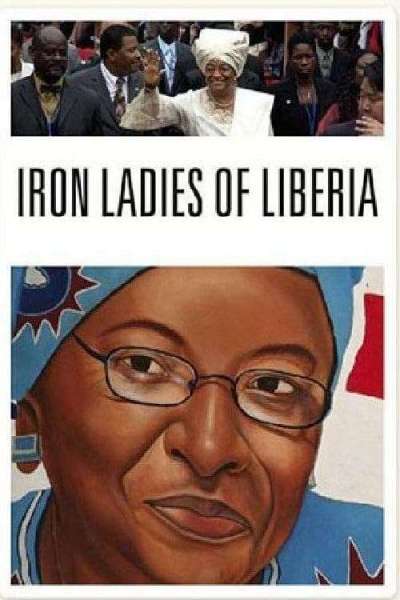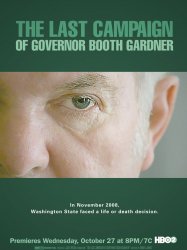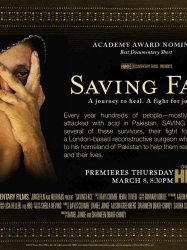Iron Ladies of Liberia is a film of genre Documentary directed by Daniel Junge
Iron Ladies of Liberia (2007)

If you like this film, let us know!
Length 1h17
Directed by Daniel Junge
Genres Documentary
Themes Films set in Africa, Documentaire sur une personnalité, Documentary films about politics, Political films
Rating72%










The Iron Ladies of Liberia (2007) is an independently produced documentary film that gives behind-the-scenes access to President Ellen Johnson-Sirleaf's first year in government. Johnson-Sirleaf is Africa's first female president.
Synopsis
The film opens with journalist Siatta Scott Johnson's narration over Johnson-Sirleaf's inauguration on 16 January 2006. Among the distinguished guests in attendance are the then first lady of the USA Laura Bush, secretary of state Condoleezza Rice, and South African president Thabo Mbeki. Ellen Johnson Sirleaf is the first ever freely elected female head of state in Africa.Comments
Leave comment :
Suggestions of similar film to Iron Ladies of Liberia
There are 6 films with the same director, 8968 with the same cinematographic genres, 10637 films with the same themes (including 118 films with the same 4 themes than Iron Ladies of Liberia), to have finally 70 suggestions of similar films.If you liked Iron Ladies of Liberia, you will probably like those similar films :
 , 38minutes
, 38minutesDirected by Daniel Junge
Origin USA
Genres Documentary
Themes Medical-themed films, Films about suicide, Documentary films about historical events, Documentary films about politics, Documentary films about health care, Films about psychiatry, Films about disabilities, Political films
Rating70%






Saving Face (2012)
, 40minutesDirected by Daniel Junge, Sharmeen Obaid-Chinoy
Genres Drama, Comedy, Documentary, Crime, Romance
Themes Documentary films about law, Documentaire sur une personnalité, Documentary films about health care
Rating79%





Saving Face features two women attacked by acid and their struggle for justice and healing. It follows London-based Pakistani plastic surgeon Dr. Mohammad Jawad as he journeys to Pakistan to perform reconstructive surgery on survivors of acid violence. Saving Face broaches the subject of the under-reporting of acid violence against women due to cultural and structural inequalities towards women from Pakistani men. The Acid Survivors Foundation of Pakistan, which is featured in the film, had documented more than 100 acid attacks a year in Pakistan but estimates far more due to lack of reporting.

Why Democracy? (2007)
Directed by Daniel Junge, Kazuhiro Soda, Alex Gibney, Sabiha Sumar
Themes Documentary films about politics, Political films

Our Forbidden Places (2009)
, 1h45Directed by Leïla Kilani
Origin France
Genres Documentary
Themes Films set in Africa, Films about families, Documentary films about law, Documentary films about war, Documentary films about historical events, Documentaire sur une personnalité, Documentary films about politics, Political films
Rating64%





In 2004, the King of Morocco launched an Equity and Reconciliation Commission to investigate state violence during the Years of Lead. For three years, the film follows four families in their search for the truth: Activist, young rebel soldier or simple citizen, either they or their relations were imprisoned in different parts of Morocco. Each person tries to "find out", discover a "reason", to be able to mourn. But forty years later, the state secret finally unveils the existence of another, more intimate secret, the family secret. They all feel the need to reconstruct history and recover their parents, taken from them twice over, once by their disappearance and another by the secret. Choosing between deeply set silences, lies and taboos within and outside the families, over forty years.

Sea Point Days (2008)
, 1h36Origin South africa
Genres Documentary
Themes Films set in Africa, Films about racism, Documentary films about racism, Documentary films about law, Documentaire sur une personnalité, Documentary films about politics, Documentary films about cities, Political films
Rating68%





Alongside the southernmost urban centre in Africa, separating city from ocean, lays a very special strip of land. Set against the beautiful backdrop of the Atlantic Ocean on one side and Signal Hill on the other, the Sea Point Promenade – and the public swimming pools in its centre – forms a space unlike any in Cape Town. Once a bastion of Apartheid exclusivity, it is nowadays unique in its apparently easy mix of age, race, gender, religion, wealth status and sexual orientation. Somehow this space has become one where all South Africans feel they have a right to exist, and where the possibility of happiness in a divided world doesn't seem unfeasible. But what is the reality of those coming here? How do people see their past, their present in this space and their future in this country?

Mandela (1996)
, 1h58Genres Documentary, Historical
Themes Films set in Africa, Films about racism, Documentary films about racism, Documentary films about law, Documentaire sur une personnalité, Documentary films about politics, Political films
Rating69%





The documentary is the official film biography of Nelson Mandela, the first democratically elected president of the ethnically united South Africa. The film touches on Nelson Mandela's childhood, family, education, and his long struggle to gain freedom for all the various ethnic groups in South Africa, including his experiences on the Robben Island prison.

Death of Apartheid (1995)
, 50minutesDirected by Mick Gold
Origin United-kingdom
Genres Documentary
Themes Films set in Africa, Films about racism, Documentary films about racism, Documentary films about law, Documentaire sur une personnalité, Documentary films about politics, Political films
Rating66%






Origin Israel
Genres Documentary, Historical
Themes Films set in Africa, Films about religion, Documentary films about law, Documentary films about war, Documentary films about historical events, Documentaire sur une personnalité, Documentary films about politics, Documentary films about religion, Political films, Films about Jews and Judaism
Rating59%






Budrus (2010)
, 1h10Directed by Julia Bacha
Origin USA
Genres Documentary
Themes Films set in Africa, Films about religion, Documentary films about law, Documentary films about war, Documentary films about historical events, Documentaire sur une personnalité, Documentary films about politics, Documentary films about religion, Political films, Films about Jews and Judaism
Rating76%





Jordana Horn in The Jewish Daily Forward states that: Budrus [is] a documentary by Julia Bacha that examines one West Bank town’s reaction to Israel’s construction of the security barrier. The town, with a population of 1,500, was set to be divided and encircled by the barrier, losing 300 acres of land and 3,000 olive trees. These trees were not only critical for economic survival but also sacred to the town’s intergenerational history. The film tells the story of Ayed Morrar, a Palestinian whose work for Fatah had led to five detentions in Israeli jails, but whose momentous strategic decision that the barrier would be best opposed by nonviolent resistance had far-reaching ramifications.

Apartheid Did Not Die (1998)
, 51minutesDirected by John Pilger
Genres Documentary
Themes Films set in Africa, Films about racism, Documentary films about racism, Documentary films about law, Documentaire sur une personnalité, Documentary films about politics, Political films
Actors John Pilger
Rating68%





 Connection
Connection